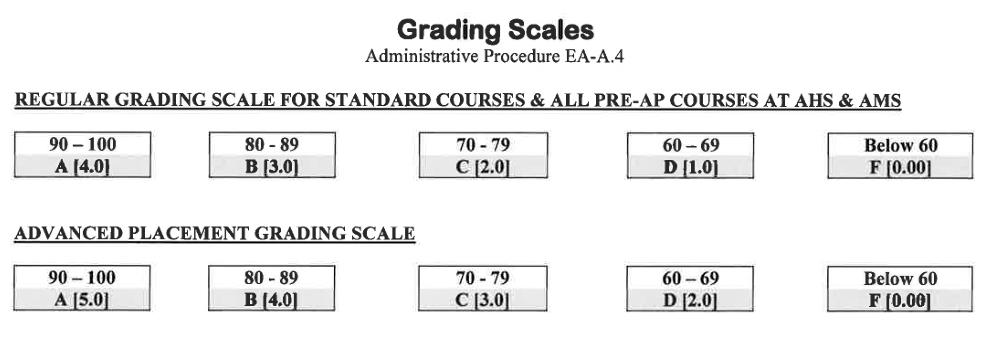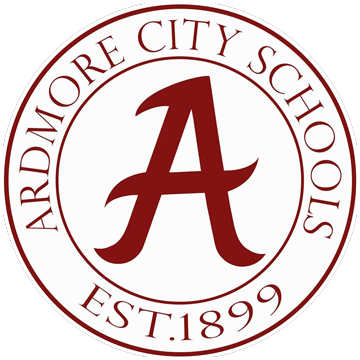Concurrent Enrollment
Concurrent enrollment is an opportunity for students who have met their required credits for graduation to begin taking college classes during their academic day. When a student earns college credit through concurrent enrollment, school districts shall provide academic credit for any concurrently enrolled higher education courses that are correlated with the academic credit awarded by the institution of higher education. Academic credit shall only be transcripted as elective credit if there is no correlation between the concurrent enrollment higher education course and a course provided by the school district (70 O.S. § 2001, Section 628.13).
Grading Scale for Concurrent Enrollment is the same as for all standard courses at Ardmore High School as follows:

The student must be enrolled in less than a full-time load at the high school. However, if the college course is dropped or the student stops attending for any reason, the high school counselor must be notified immediately and the student will be enrolled in a class at the high school to meet the full day requirement.
Students wishing to concurrently enroll must obtain a written recommendation from their high school counselor, written permission from their parent(s), and a signed statement from the high school principal confirming their eligibility to satisfy, by spring of their senior year, the high school graduation requirements, including curricular requirements for college admissions.
Students who plan to enroll concurrently must provide proof of enrollment in college courses to the high school counselor. It must be provided no later than two days after the first day of high school classes of each term that concurrent enrollment is requested. A receipt for payment of tuition and fees will be considered proof of enrollment.
The following Eligibility information is provided from Murray State College
Seniors: To be eligible for concurrent enrollment, a high school senior must:
Have participated in the National American College Testing (ACT) program and scored a minimum composite of 19 or the equivalent on the Scholastic Aptitude Test (SAT) or have a high school GPA of 3.0
If your ACT composite is not a 19 or higher you must have at least a 3.0 high school GPA and a sub-score of at least 19 in the appropriate subject area.
Be eligible to satisfy requirements for graduation from high school (including curricular requirements for college admission) no later than the spring of the senior year, as stated by the high school principal.
Have a workload of no more than the equivalent of 19 credit hours in a regular semester (1/2 high school unit, equals 3 college semester credit hours) or 6 courses.
Have the signed permission of the parent/legal guardian, signed recommendation of the high school counselor, and the signed permission of the high school principal.
Junior Student Eligibility
Have participated in the National American College Testing (ACT) program and scored a minimum composite of 21 or the equivalent on the Scholastic Aptitude Test (SAT) or have a high school GPA of 3.5.
If your ACT composite is not a 21 or higher you must have at least a 3.5 high school GPA and a sub-score of at least 19 in the appropriate subject area.
Be eligible to satisfy requirements for graduation from high school (including curricular requirements for college admission) no later than the spring of the senior year, as stated by the high school principal.
Have a workload of no more than the equivalent of 19 credit hours in a regular semester (1/2 high school unit, equals 3 college semester credit ours) or 6 courses.
Have the signed permission of the parent/legal guardian, signed recommendation of the high school counselor, and the signed permission of the high school principal.
